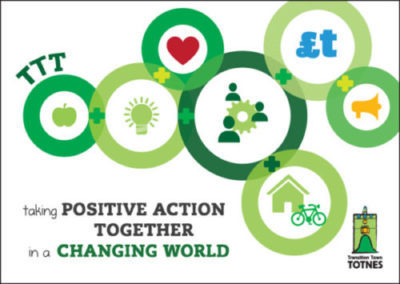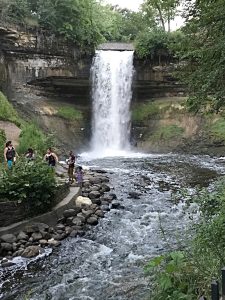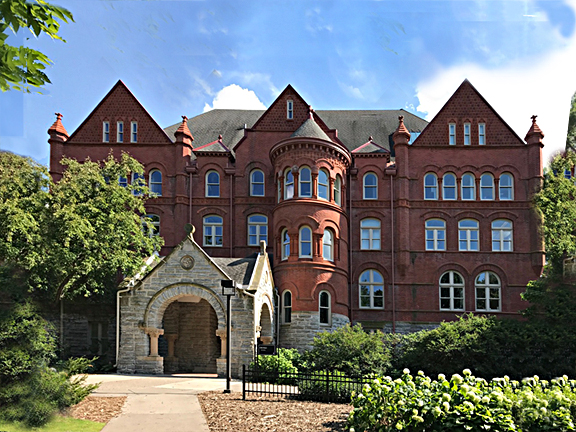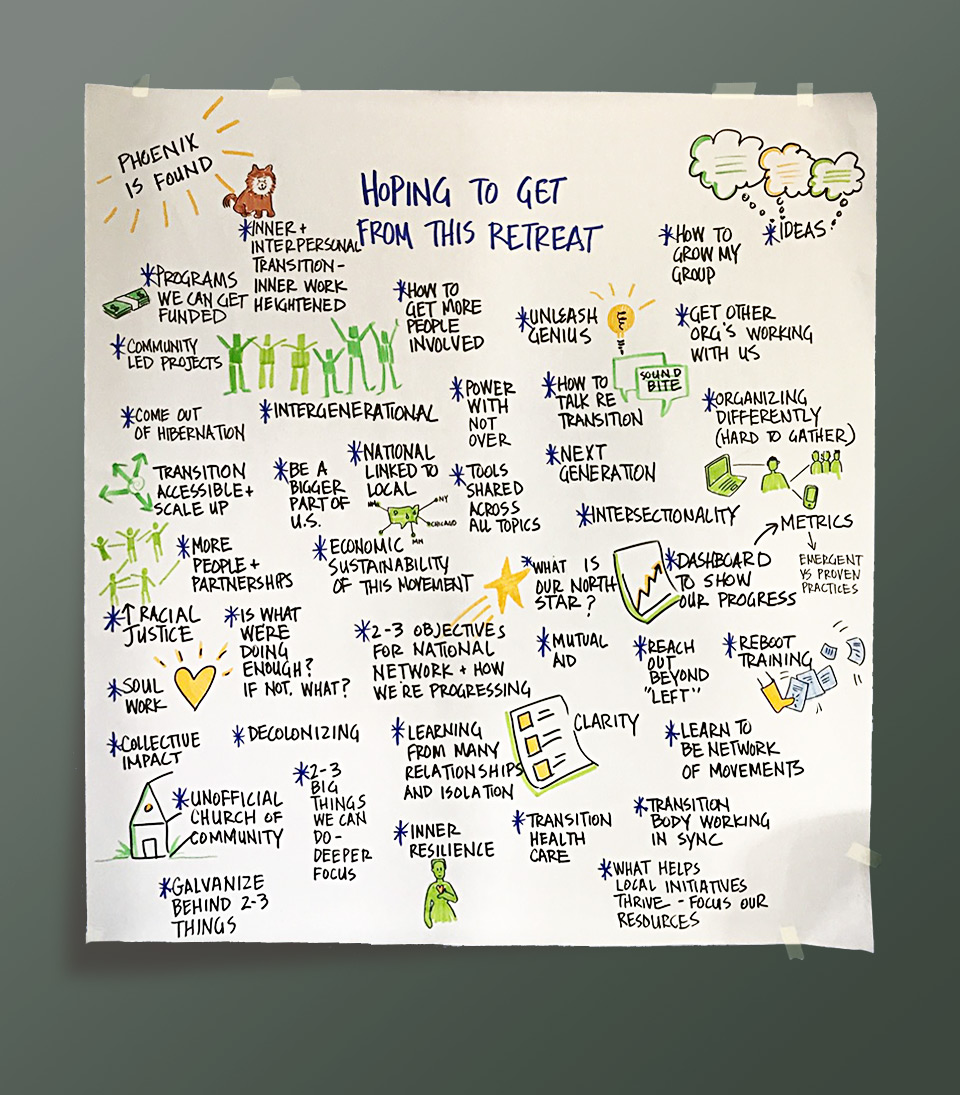 Transition Towns are part of an international network based in Totnes, England where the movement was born. To better serve their many member towns, some countries, including the US, have created national networks. Transition US (TUS) was created in 2007 to help support the growing number of Transition Towns in the US.
Transition Towns are part of an international network based in Totnes, England where the movement was born. To better serve their many member towns, some countries, including the US, have created national networks. Transition US (TUS) was created in 2007 to help support the growing number of Transition Towns in the US.
This year, on July 27-Aug 1, 2017, TUS held its first-ever National Gathering, at MacAlester College in St. Paul, MN. It brought together Transition Towns from across the country for six days of workshops and networking. About 300 people, including five of us from Transition Town Media (TTM), attended at least some part of the week’s activities. TTM was well-represented throughout, co-leading 3 of about 40 workshops in the main part of the 6-day event.
The theme of the gathering was Growing a Movement for Resilient Communities: Broadening, Deepening, and Scaling Up. The idea was to broaden our scope by training ourselves in areas we felt lacking, to deepen our understanding of what our work entails, and to scale up our efforts by forging stronger ties with our fellow Transitioners, our allies, and our national hub, TUS. The goal of the conference was to teach each other skills, get re-inspired by the work we are all doing, and build a stronger network so that we can make an even bigger difference in the future of our planet.
 The contents of the National Gathering workshops were organized as Permaculture zones, a design strategy that organizes areas in ever-larger concentric circles. As an indication of the breadth of this conference, Zone 0 was Growing Resilient People (Inner Transition, personal resilience); Zone 1 was Growing Resilient Households (Reskilling, Homesteading); Zone 2 was Growing Strong Groups (group dynamics, effective collaboration); Zone 3 was Growing Effective Partnerships (working with local government, regional organizing); Zone 4 was Growing Successful Projects (projects that Transitioners have done successfully); and Zone 5 was Growing an Unstoppable Movement (rebuilding the commons, community rights, reclaiming our economy). These rich offerings allowed us to cover the gamut of what we do, from how to remain resilient when the work we do is daunting or frustrating to the national and global perspectives that we need to be cognizant of as we do our work locally.
The contents of the National Gathering workshops were organized as Permaculture zones, a design strategy that organizes areas in ever-larger concentric circles. As an indication of the breadth of this conference, Zone 0 was Growing Resilient People (Inner Transition, personal resilience); Zone 1 was Growing Resilient Households (Reskilling, Homesteading); Zone 2 was Growing Strong Groups (group dynamics, effective collaboration); Zone 3 was Growing Effective Partnerships (working with local government, regional organizing); Zone 4 was Growing Successful Projects (projects that Transitioners have done successfully); and Zone 5 was Growing an Unstoppable Movement (rebuilding the commons, community rights, reclaiming our economy). These rich offerings allowed us to cover the gamut of what we do, from how to remain resilient when the work we do is daunting or frustrating to the national and global perspectives that we need to be cognizant of as we do our work locally.
The first two days consisted of one- or two-day intensives on topics such as Effective Collaboration, Local Economic Change, Social Permaculture, Community Rights Organizing, Inner and Group Resilience, and Taking Transition to the Next Level. We were also treated to a screening of the new film/documentary, Tomorrow, that follows the real-life journey of a young couple contemplating having children but concerned about the future their children would be facing. They seek out positive actions being taken around the world to ensure a better future. The film will be showing at the Bryn Mawr Film Institute on Sept 18th, introduced by local change activist, Judy Wicks. We encourage you to see it and see what kinds of changes are possible!
 The main part of the Gathering began Friday night with a keynote speech by Richard Heinberg, a Fellow at the Post Carbon Institute, an organization closely allied with Transition US. Richard spoke about the impact of fossil fuels on the environment and climate change, and the importance of moving to renewables.
The main part of the Gathering began Friday night with a keynote speech by Richard Heinberg, a Fellow at the Post Carbon Institute, an organization closely allied with Transition US. Richard spoke about the impact of fossil fuels on the environment and climate change, and the importance of moving to renewables.
The next two days were filled with workshops, roughly eight running simultaneously in three time-slots on Saturday, two on Sunday. These were primarily presentations by Transitioners, describing initiatives they’ve launched in their own Transition Towns.
TTM’ers put on three workshop presentations: Sari described our Solarize program on a panel about Community-Powered Energy; Dawn & Julie talked about how to start a FreeStore, the benefits and challenges, and the impact it’s made here in Media; and Martin shared the lessons we’ve learned about being an effective change-making organization, a very popular workshop that got TTM lots of recognition. Other workshops included How to Run a Repair Café, Starting a Local Food Revolution, Using Permaculture to Design the Future, Running a Successful Fundraiser, Investing in Local Economies and Co-ops, Building Local Partnerships to Further our Impact, Conflict Resolution Skills, and much more.
Saturday night, Phyllis Young, one of the Native American elders from Standing Rock gave a moving talk about the importance of protecting our water and our future. She led us in a beautiful ceremony, mixing waters from the Missouri with water brought by participants from their local streams and rivers, symbolizing our commingled support for the planet and the life-giving systems on which we depend.
 After Sunday’s closing sessions, a core group of about 30 of us, including 2 TTM’ers, stayed another two days to take part in a Movement Strategy session. We discussed the role and function of Transition US, and how we can structure our national organization to make all of us more effective and more empowered. The TUS staff described the structure, mission, and goals of the national organization, as well as the struggles of supporting such a large, loosely-knit network of autonomous, locally-focused groups. Strong communication in both directions was seen to be key, and maintaining the bottom-up nature of our movement is essential.
After Sunday’s closing sessions, a core group of about 30 of us, including 2 TTM’ers, stayed another two days to take part in a Movement Strategy session. We discussed the role and function of Transition US, and how we can structure our national organization to make all of us more effective and more empowered. The TUS staff described the structure, mission, and goals of the national organization, as well as the struggles of supporting such a large, loosely-knit network of autonomous, locally-focused groups. Strong communication in both directions was seen to be key, and maintaining the bottom-up nature of our movement is essential.
Our post-conference session reinforced our core commitment: to reduce damaging human impacts on our planet by reducing our carbon footprint while still celebrating our humanity, our connections to each other, and our connection to nature. We further committed to bringing about a more socially, economically, and racially just society, beginning with making our own movement inclusive and relevant to everyone – people of all ethnic backgrounds, economic situations, political and religious beliefs, age, gender and sexual orientation. We also acknowledged the importance of inner transition to our work, since community resilience must include our own resilience, and being grounded in why we are doing the work we do helps us persevere in that work. Focusing on hands-on, practical, and positive projects and events—building things rather than protesting things—was also seen as integral to our movement (although protesting is sometimes necessary, too).
All in all, the Gathering was refreshing, engaging, and empowering to each of us. We left Minnesota with new resolve and new friendships, promising to work together as effectively and authentically as we can.


Leave a Reply